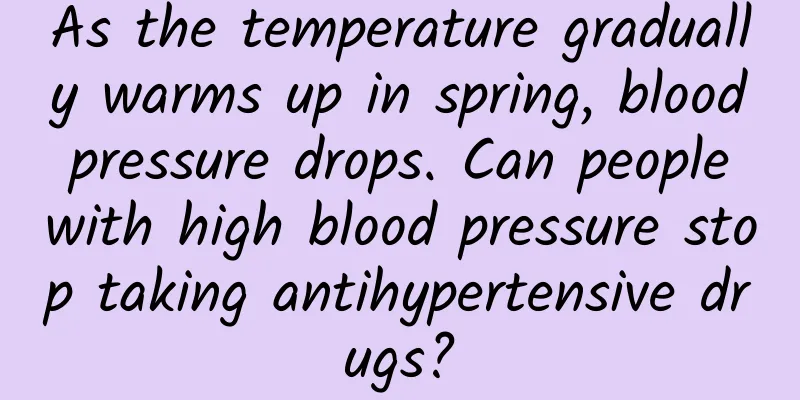As the temperature gradually warms up in spring, blood pressure drops. Can people with high blood pressure stop taking antihypertensive drugs?

|
Several people with high blood pressure asked Huazi the same question. That is, after entering spring, the temperature gradually rises and the blood pressure drops. Do they need to adjust the medication or can they stop taking the medication? Huazi told them that seasonal changes will affect blood pressure, which is manifested as higher blood pressure in cold weather and lower blood pressure in hot weather. Hypertensive patients can adjust their medication according to the fluctuation of blood pressure, but don't rush to stop taking the medication. 1. Blood pressure fluctuates with the seasons In China, the northern region has four distinct seasons, and different seasons have different effects on blood pressure, mainly increasing in autumn and winter and decreasing in spring and summer. On average, the blood pressure values in winter and summer differ by 12/6 mmHg. Some people whose blood pressure rises slightly in winter may return to normal blood pressure in summer. The impact of seasons on blood pressure is mainly due to temperature differences. When the climate is cold, the human blood vessels contract and blood pressure rises. When it is warm, the human blood vessels dilate and blood pressure drops. In addition, when the weather turns warmer, people's activities increase, they sweat easily, which reduces blood volume and increases the amount of sodium ions that increase blood pressure excreted with sweat, which also lowers blood pressure. 2. Adjust antihypertensive drugs according to blood pressure fluctuations Hypertensive patients should understand one thing: the purpose of drug adjustment is to avoid too low blood pressure. Antihypertensive drugs are not adjusted according to the season, but after the season affects blood pressure, drugs are adjusted according to the fluctuation of blood pressure values. What kind of blood pressure can be adjusted? For young and middle-aged hypertensive patients under 65 years old, keeping blood pressure at a lower level is more protective for the body. Usually 130/80 mmHg is used as the control target. If symptoms of insufficient blood supply such as palpitations and dizziness occur during the blood pressure reduction process, or if blood pressure drops below 110/60 mmHg, it is necessary to reduce the dosage of the medicine for adjustment. For elderly hypertensive patients over 65 years old, there may be more serious vascular stenosis. If the blood pressure drops too quickly and too low, it will affect the blood supply to important organs such as the heart, brain or kidneys. Therefore, the blood pressure reduction process should be slow. The blood pressure target can be set at 150/90 mmHg at the beginning; if it can be tolerated, it can continue to drop to 140/90 mmHg, and gradually drop to around 130/80 mmHg, but it is not recommended to drop to a lower value. If the blood pressure of an elderly person is lower than 120/60 mmHg, or if there are symptoms of insufficient blood supply, medication adjustments should be made and the dosage reduced. 3. It is not recommended that patients with hypertension stop taking medication completely. Some patients with hypertension asked Huazi, if their blood pressure drops to the normal range, can they stop taking medication? Huazi does not recommend that patients with hypertension stop taking medication completely. Because we need to understand one thing, blood pressure will only drop under the influence of seasonal factors, not that hypertension is cured. When the weather turns cooler, blood pressure will rise again and medication will have to be resumed. Most of the adverse reactions of antihypertensive drugs occur in the early stage of medication. After a period of continuous medication, the human body can gradually adapt and reduce the symptoms of adverse reactions. If the drug is stopped for a long time, then when you take the drug again, you will have to go through the process of adapting to the adverse reactions again. Therefore, when adjusting medications for hypertensive patients, it is recommended to reduce the dosage to the minimum therapeutic dose for maintenance treatment rather than completely stop the medication. For hypertensive patients, even if affected by the temperature, it is difficult to lower blood pressure to the level of hypotension with the minimum therapeutic dose of antihypertensive drugs. In addition, maintaining the habit of taking medication regularly can improve one's medication compliance, which is very important for the long-term treatment of hypertension. When reducing the dosage of antihypertensive drugs, you must also follow the dosage rules in the drug instructions. You can break a tablet and take it every day (note that "controlled-release tablets" and some "sustained-release tablets" cannot be broken), but you cannot take one tablet every two days. Antihypertensive drugs may have a "drug withdrawal rebound" phenomenon, and some long-acting antihypertensive drugs will not show the best effect for 2 weeks. Therefore, when reducing the dosage, reduce it slowly at intervals of 2 weeks, and maintain treatment after reducing it to the minimum treatment dose. In summary, blood pressure fluctuates with the seasons, and patients with hypertension can adjust their medications according to the fluctuations in blood pressure. When adjusting medication, you should monitor and record your blood pressure, and reduce the dosage slowly under the guidance of a doctor, and don't rush for quick results. If you find any problems during the medication adjustment process, consult a doctor or pharmacist in a timely manner. I am pharmacist Huazi, welcome to follow me and share more health knowledge. |
>>: World Kidney Day | The secrets of drinking water can no longer be hidden
Recommend
Can chamomile essential oil relieve menstrual cramps?
Dysmenorrhea brings great pain to women, but we h...
Unexplained bruises on women
In daily life, many people sometimes experience b...
How long is it normal to delay your period?
The phenomenon of delayed menstruation is a probl...
Women often have dry cough
The adverse effects of dry cough are extremely se...
Menstruation is not complete but the amount is very small
For women, if there is a problem with their menst...
Treatment of postmenopausal vaginitis
Different patients have different physical consti...
Will I still ovulate after I conceive?
Pregnancy is inseparable from sperm and eggs. For...
How to keep the fetus full term in late pregnancy
Nowadays, many people have developed the mentalit...
How to cure abnormal leucorrhea?
Abnormal leucorrhea is a problem that many women ...
What should I do if I always sweat while sleeping during pregnancy?
Once they get pregnant, many women will become em...
How many days are there in six weeks of pregnancy
The pregnancy process starts from the first day o...
Why doesn't pregnancy start from sexual intercourse?
We all know that pregnancy is calculated from the...
What to eat to make breasts bigger quickly and effectively
Girls with small breasts that are congenitally un...
Hot and cold sweats during menstruation
There are many reasons why a girl has hot flashes...
Counterpoint: India's smartphone market to exceed $50 billion by 2025
The value of India’s smartphone market is expecte...

![[“Vision” is very important] People with diabetes, if you don’t get this check-up done, be careful of serious problems!](/upload/images/67f1868b34e80.webp)







